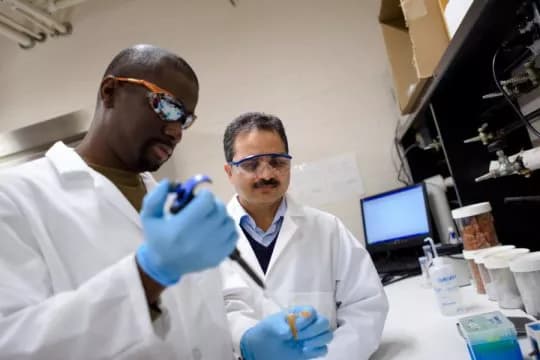
Neurodegenerative Diseases: The Case Of The Sticky Protein
Proteins are like a body's in-house Lego set. These large, complex molecules are made up of building blocks called amino acids. Most of the time, proteins fold correctly, but sometimes they can misfold. This misfolding causes the proteins to get sticky, and that can promote clumping, or aggregation, which is the hallmark of several neurodegenerative diseases such as ALS, Alzheimer's and Parkinson's.
The protein's stickiness is a result of surface hydrophobic interactions that are important for many biological functions. The problem is that researchers don't have good tools to measure this stickiness with high sensitivity.
Now, an interdisciplinary team at Michigan Technological University has assembled new tools to solve the case of the sticky protein. Their work on improving hydrophobicity detection will be published in Scientific Reports Friday morning.
Using the fluorescent probes, the team measured hydrophobicity in three proteins: Bovine Serum Albumin (BSA), apomyoglobin and myoglobin. Compared to a commonly used commercial sensor (ANS), these new BODIPY-based hydrophobic sensors showed much stronger signal strengths, with up to a 60-fold increase in BSA.
"This is like going from having one 40-watt light bulb and then having 60 of them in the same room, just imagine the difference in illumination," says Ashutosh Tiwari, an associate professor of chemistry at Michigan Tech and the corresponding author for the study.
The above post is reprinted from materials provided by Michigan Technological University. The original item was written by Allison Mills. Note: Materials may be edited for content and length.
Disclaimer: DoveMed is not responsible for the adapted accuracy of news releases posted to DoveMed by contributing universities and institutions.
Primary Resource:
Dorh, N., Zhu, S., Dhungana, K. B., Pati, R., Luo, F. T., Liu, H., & Tiwari, A. (2015). BODIPY-Based Fluorescent Probes for Sensing Protein Surface-Hydrophobicity. Scientific reports, 5.
Related Articles
Test Your Knowledge
Asked by users
Related Centers
Related Specialties
Related Physicians
Related Procedures
Related Resources
Join DoveHubs
and connect with fellow professionals

0 Comments
Please log in to post a comment.